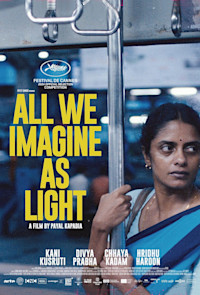| SHADOWS ON THE WALL | REVIEWS | NEWS | FESTIVAL | AWARDS | Q&A | ABOUT | TALKBACK | |||||||||||||||||||||||||||||
 Shadows off the beaten path Shadows off the beaten pathIndies, foreign, docs and shorts...
On this page:
ALL WE IMAGINE AS LIGHT |
THE COLOURS WITHIN |
I'M STILL HERE
| |||||||||||||||||||||||||||||
| See also: SHADOWS FILM FESTIVAL | Last update 27.Oct.24 | |||||||||||||||||||||||||||||
|
All We Imagine as Light Review by Rich Cline | 
CANNES FILM FEST TORONTO FILM FEST  Is it streaming?
| 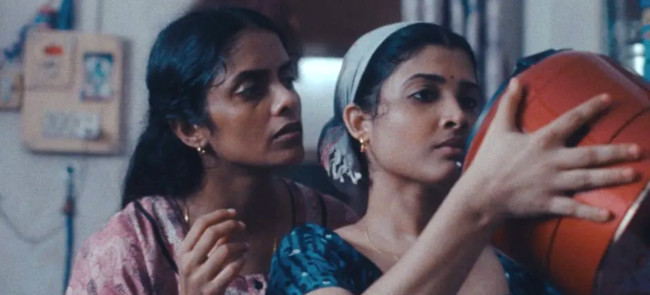 Gorgeously textured to tell a complex story in an unusually uplifting way, this Indian drama circles around three women at a key point in their lives. Without simplifying anything, writer-director Payal Kapadia maintains an effortlessly light tone that cuts through the surfaces to find vivid emotions. So the story is hugely involving and, while the Indian setting is specific, the themes will reverberate for everyone in the audience. In Mumbai, senior nurse Prabha (Kusruti) hasn't heard from her husband in a year. He moved to Germany shortly after their arranged marriage. She shares a flat with younger nurse Anu (Prabha), whose secret boyfriend Shiaz (Haroon) is an inappropriate match because of his Muslim background, although neither of them care. Prabha and Anu work with Parvaty (Kadam), the hospital cook who is being evicted from her apartment because she can't prove that she has lived there for 22 years. When she decides to move home to the seaside, Prabha and Anu travel with her. Like many others, these three women moved to the big city to find work, and now they feel trapped here. While the overall narrative feels gentle and meandering, Kapadia is carefully observing the details of everyday life. Little plot wrinkles abound, as Prabha wrestles with the attentions of a doctor (Nedumangad), Anu bristles against the constraints of the society, and Parvaty questions who she is. "In the city," she says, "you're only real if you have papers." Performances are remarkably open-handed, as these people live by the rules but are beginning to wonder why. As Prabha, Kusruti is respectable but feels a gnawing emptiness in her straight-arrow personal life. By comparison, Prabha's Anu is living large, even if it gives her a bad reputation. What she really wants is a serious relationship with Haroon's likeable Shiaz. Their scenes are remarkably sweet and tender. And as Parvaty, Kadam brings a sparky inner frustration bourne from years of subtle injustice. Even side roles have a strong impact, including a man (Sami) who nearly drowns in the final act and a teenager (Limaye) in his own bubble in a beachside cafe. It's painful to see how these three women are feeling stuck in their lives, but the way they casually impact each other is lovely to watch, sparking change simply because of their compassion and empathy. And in the end the film empowers us to consider if we're where we should be.
|
| The Colours Within Review by Rich Cline | 
| 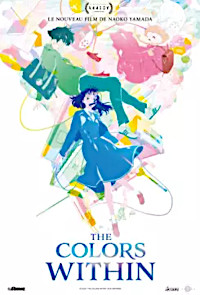 dir Naoko Yamada scr Reiko Yoshida prd Eunyoung Choi, Yoshihiro Furusawa, Genki Kawamura, Kohei Sakita with Sayu Suzukawa, Akari Takaishi, Taisei Kido, Yui Aragaki, Keiko Toda, Yasuko, Aoi Yuki, Minako Kotobuki release Jpn 30.Aug.24, US 24.Jan.25, UK 31.Jan.25 24/Japan Toho 1h41  Is it streaming?
|  Sophisticated visual textures elevate this teen anime drama, augmenting standard designs with an inventive use of light, colour and detail. And the story is strongly resonant as it taps into that feeling that we don't belong anywhere, while the offbeat characters are easy to identify with as they help each other find their way. This is a gorgeous looking film that features terrific music and a strong emotional undercurrent. At a Catholic girls boarding school, Totsuko (Suzukawa) feels like an outsider, especially as she sees people and objects as colours. So she struggles to make friends. Then one day Kimi (Takaishi) doesn't turn up for class, and Totsuko finds her working in a used book store and practicing guitar. When cute guy Rui (Kido) approaches them awkwardly, Totsuko claims to play keyboards and invites Rui join their non-existent band. Soon they are learning their instruments and beginning to write songs. And Rui's skill with computers and the theremin give the group an unusual edge. When seeing through Totsuko's eyes, the film becomes strikingly visual, rendering emotions and personality as waves of deep hues that swirl and intersect. And Totsuko herself is fascinating, hiding her synesthesia so others don't think she's strange. As a result, nobody can figure her out, which isolates her further. But in her friendship with the timid Kimi and artistic Rui, she blossoms into someone she would never have expected. And her heart's desire is to see her own colour. The film's design is traditional anime, but director Yamada overlights it beautifully, creating a glowing aura that echoes how Totsuko sees the world. There's also an eye-catching use of textures and angles that bring imagery to life in fresh and original ways. This helps even the smaller side roles to become more distinct, including Sister Hiyoshiko (Aragaki), a teacher who understands Totsuko more than she knows, and Kimi's knowing grandmother (Toda). As this teen band begins expressing itself through song, the film is also able to introduce several styles of music, leading up to their first gig at the school Valentine's party. Like these three kids, their music is a mix of genres, moving from a rock-n-roll banger to an arty ballad and a full on disco anthem. This allows the movie to become a celebration of how it's often necessary to break the rules to find the truth about who you are and which tribe you fit in.
|
| I’m Still Here Ainda Estou Aqui Review by Rich Cline |  MUST
MUST  SEE SEE
| 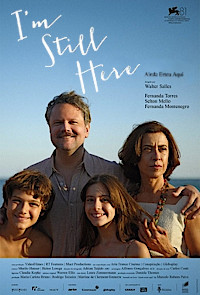 dir Walter Salles scr Murilo Hauser, Heitor Lorega prd Walter Salles, Rodrigo Teixeira, Maria Carlota Bruno with Fernanda Torres, Fernanda Montenegro, Selton Mello, Valentina Herszage, Luiza Kosovski, Guilherme Silveira, Barbara Luz, Cora Ramalho, Olivia Torres, Antonio Saboia, Thelmo Fernandes, Caio Horowicz release Br 7.Nov.24, US 17.Jan.25, UK 21.Feb.25 24/Brazil 2h16 VENICE FILM FEST TORONTO FILM FEST  Now streaming...
| 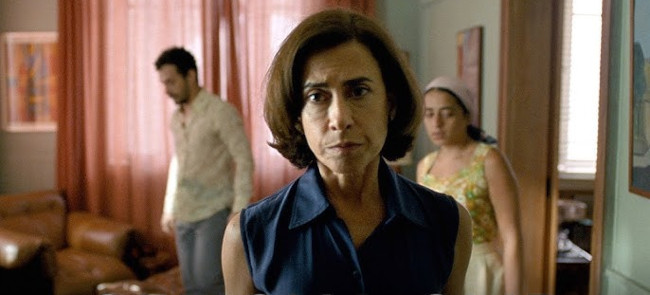 Based on a true story that spans four decades, this Brazilian drama is gorgeously well made, packed with earthy character detail that keeps it from turning melodramatic or sentimental. Veteran filmmaker Walter Salles skilfully follows a spirited family as it traverses a situation that churns with mind-boggling tension. And aside from being this family's story, the film also shines a light into Brazil's dark days under a vicious dictatorship. In sunny 1971 Rio, the Eunice and Rubens Paiva (Torres and Mello) are raising their five rambunctious children on the beach. Just as eldest daughter Vera (Herszage) moves to London with her cousins, former congressman Rubens is inexplicably arrested. And Eunice and teen Eliana (Kosovski) are detained and released. But they never learn why Rubens was imprisoned, or where he is. Eventually, Eunice moves the kids back to her hometown Sao Paulo and trains as a lawyer. It takes 25 years to get an official statement, and another 20 for the government to admit guilt. Salles maintains an everyday rhythm throughout this family's ordeal, which makes it almost unnervingly easy to identify with them in this situation. It also captures how their family life continues as normal, only without their husband and father. These are smart people with a playful approach to life, but now it is tinged with pain and confusion as Eunice seeks answers and tries to help her children carry on. In the focal role, Torres gives a remarkably nuanced performance. Eunice is quiet and tenacious, and we can see her deeper emotions just under the surface, as well as her determination to protect her children. Each member of this boisterous extended family feels thoroughly authentic, which leads to a series of unusually lively parties in which, like most of these gatherings in real-life, we're unsure just how everyone is connected, but it's clear they are. And in the story's epilogue, the great Montenegro gives Eunice a luminous edge. While there's plenty of tension and outrage woven throughout this film, you wouldn't call it a thriller. Instead, Salles' measured approach puts this horrific chapter in Brazil's history in the context of how it affects living, breathing people. This not only highlights just how insidious these events were, but it adds a thoroughly chilling resonance as we witness the global rise of right-wing authoritarian power today. Facing up to what happened in the past has never felt so urgent.
| 
See also: SHADOWS FILM FESTIVAL © 2024 by Rich Cline, Shadows
on the Wall
HOME | REVIEWS | NEWS | FESTIVAL | AWARDS
| Q&A | ABOUT | TALKBACK | | ||||||||||||||||||
